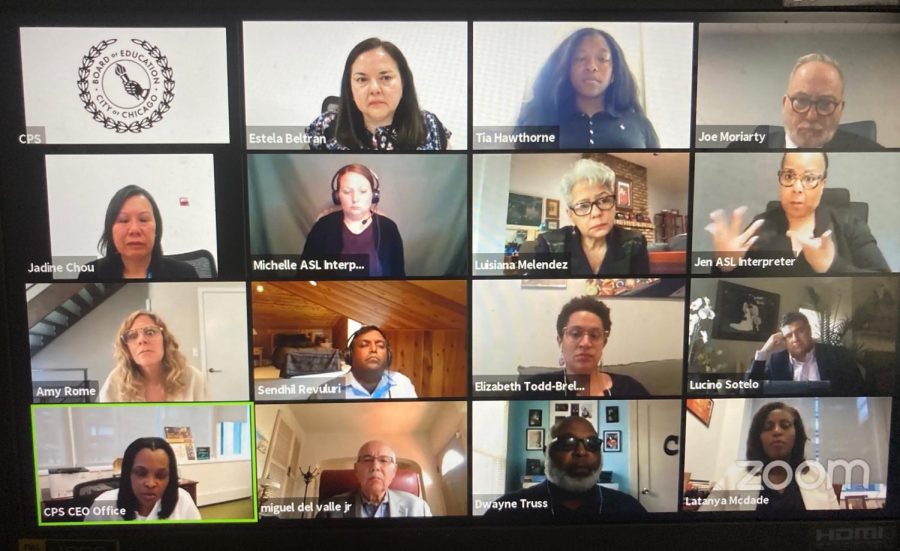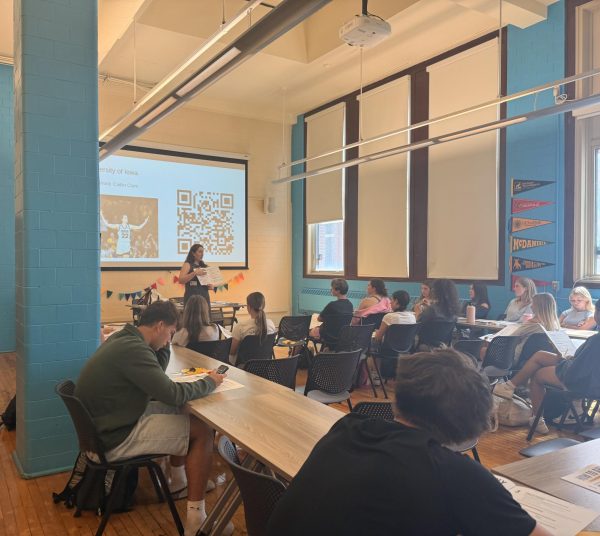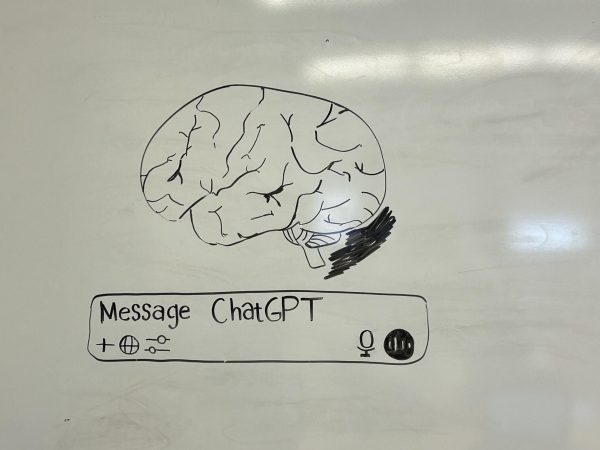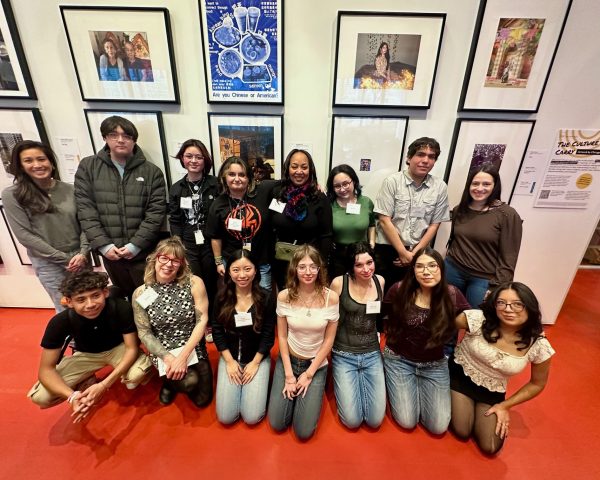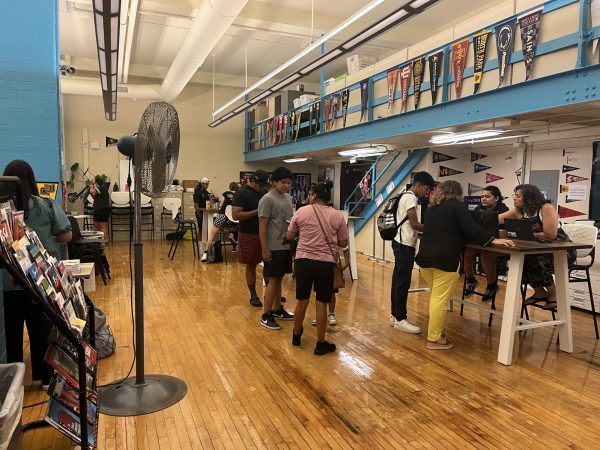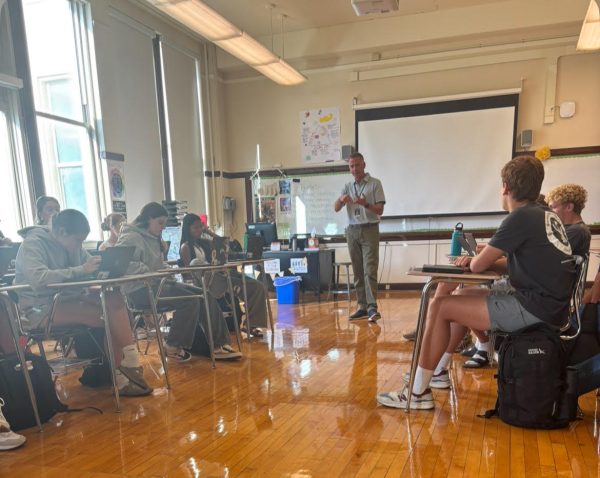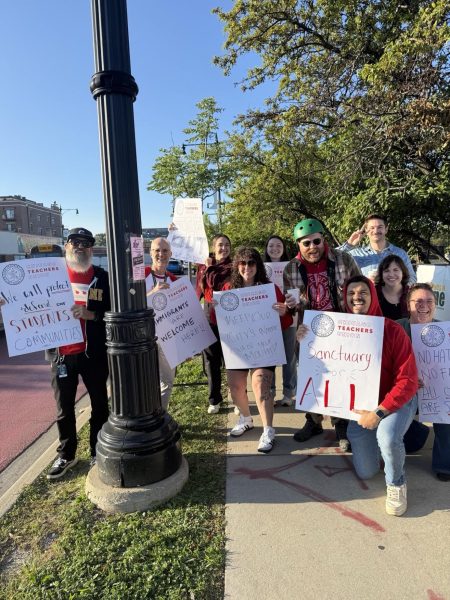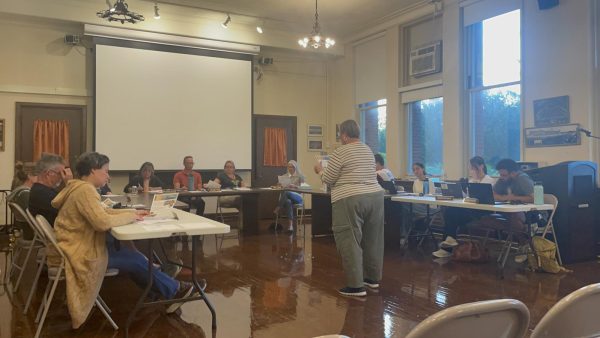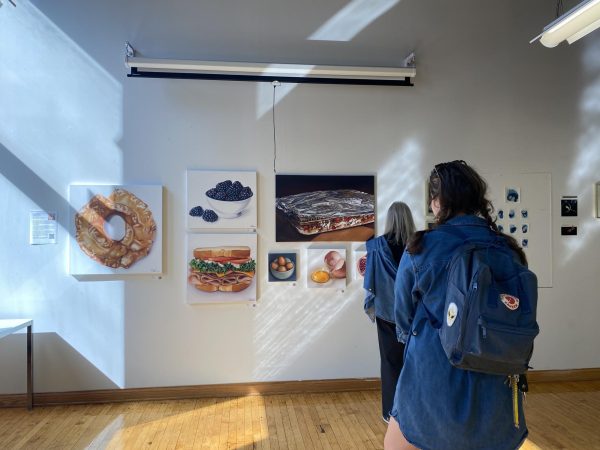LSC to make hotly debated school resource officer decision this month
The CPS Board of Education meets at their June virtual board meeting (Screenshot from Board of Education Zoom meeting June 24)
Many Chicago and CPS community members are using this national moment of changing race relations to protest the use of the Chicago Police Department (CPD) in school buildings across the city. Many people are concerned about police brutality spilling into the school environment, after nationwide protests in the wake of George Floyd’s killing at the hands of police sparked further questions of police brutality in general.
The CPS Board of Education voted in June 4-3 not to terminate the $33 million contract that provided “144 school resource officers (SROs) assigned to schools, 48 mobile school officers and 22 staff Sergeants to CPS,” last school year according to the agenda for the board meeting. School resource officers are members of the CPD who are stationed at CPS schools. The decision now has been put into the hands of Local School Councils (LSC), who have the ability to remove SROs.
A busy month lies ahead for LSCs and the Board of Education, as the district plans for students to return to in-person instruction.
Board member Lucino Sotelo, a CPS graduate, told The Warrior that once the LSCs vote on whether they want to keep the officers, information will be collected to see how many officers are requested for the upcoming school year. The board will then vote on the agreement and funding at the end of August.
Lane announced during their July 14 LSC special meeting that they will be holding the vote Aug. 10 to keep or do away with Lane’s SRO. A public forum starting at 6:30 p.m. will precede the vote.
According to Lane LSC Chairperson Emily Haite, LSCs are required to hold a vote between July 15 and Aug. 15 on whether to keep the officers, which were assigned to 72 of 93 district-run high schools according to WBEZ. The 93 district run-schools do not include charter, contract or SAFE high schools.
LSCs were given a “toolkit” with information to help the schools make this important resolution, including a recommended process for how to make the decision — a “step by step template,” according to Sotelo. He also said the plan makes sure that all stakeholders in the community are listened to.
The Lane LSC agreed to not rush the decision during the July 14 meeting, despite spectators urging them to make the decision before the end of July. The LSC is currently tasked with the SRO decision, as well as the ongoing debate surrounding Lane’s symbol.
A majority of the people that were using the chat to talk about the SROs during the LSC meeting were in favor of dismissing the officers.
People in support of removing police officers from schools argued in the chat that SROs perpetuate the school-to-prison pipeline and cause more student arrests, and want to terminate the contract for all schools. Many fear the officers get involved in situations that should be handled by nurses, therapists and social workers, which many schools face chronic shortages of. Some people on this side would like the money from the contract to go to those shortages instead of the officers.
On the other side of the issue are the people that feel the need to keep the officers, or at least keep the decision to the LSCs and not terminate the contract throughout CPS. A main concern is if a school shooting or another school safety issue were to occur, there would not be an officer immediately there to help.
According to Sotelo, with a lack of safety measures, some students may not feel as safe at school, something that SROs provided to some students, especially in at-risk communities. Sotelo said some argue the total removal of officers could end up being detrimental to the feeling of safety and well-being for some students.
With some people wanting to keep the contract, and others wanting to reallocate the funds, money comes up often in the debate.
One problem for the Lane LSC and schools across the city is the school probably will not receive any money back if they do remove the officer, since the contract will still be existing.
“I really understand, we’ve always wanted more social workers and counselors, and the LSC has voted to pay for counselors, finding money in the budget that we don’t normally have,” Haite said. “If we were getting that money back that the officer gets it would be a no-brainer for us, but I don’t know how it affects the budget since it’s a contract with CPS and not with us. You know the contract is still going to be there even if we get rid of the officer.”
Sotelo says some people do not fully understand the money problem.
“The district is already planning on funding social workers, counselors, nurses, etc,” Sotelo said. “We consciously fund these different important needs in an equitable manner as much as we can, while trying to fund as many needs as we can within our balanced budget responsibilities.”
CPS faces a budget deficit, according to Sotelo, and money not spent on the SROs will be needed to help balance the budget.
Lauren Marut, a 2020 Lane alumna, advocates for the termination of the contract despite the money likely not coming back to the school. She says she is hopeful that the LSC will remove the officers from Lane.
“I feel like there’s been renewed pressure, specifically from Lane students, to remove CPD from CPS,” Marut said. “I really hope that Lane’s LSC board understands that by supporting cops in schools, they, and CPS, are sanctioning the same culture that killed George Floyd and Trayvon Martin to operate alongside the city’s most valuable and vulnerable group.”
While some argue for the complete removal of the officers, Sotelo voted to retain the contract. From outreach, he said he learned that in higher risk communities, having an officer in the building can help the kids feel safe. And for Sotelo, safety is key.
“Some of the students feel safe [with the officer], and when they feel safe, they can do something as basic as attending class. And that’s important to me. … To me at the end of the day what I [care about] is that kids feel safe and kids go to school, especially in the communities that need it the most. And that’s why to me it was important to make sure that we did not take away that option from Local School Councils,” Sotelo said.
Through community outreach, Sotelo said he tried to find out the opinions of “Unheard Voices,” a main point of his argument. For Sotelo, the “Unheard Voices” are students and community members in high-risk areas who may not have the opportunity to be listened to otherwise.
Sotelo looked back to his days as a student at Wells Community Academy, where according to him, “out of the 500 freshmen that started with me, less than 200 of us graduated.” Sotelo cited safety as one of the reasons kids dropped out, with different gangs being in the school.
Sotelo said he reached out to counselors so he would have the opinion of the most at-risk kids. From gathering the opinions of the students, he said he got “mixed feedback” and “half were supportive and half were not.”
Sotelo added that he will be meeting virtually with students who want to retain SROs.
“[I am] looking forward to listening to their direct feedback and suggestions for ongoing improvement along with what’s working and why they would like to keep them in their schools,” Sotelo said. He said these will be “similar to the meeting I had with the students who advocated for not having SROs.“
NORTHSIDE VOTES TO REMOVE OFFICERS
While Lane and other schools prepare to vote over the next few weeks, the Northside College Prep LSC has already unanimously voted to remove SROs, becoming the first LSC to do so this summer.
Following the July 7 vote, in a July 9 email sent to students, staff, and parents, Principal Kelly Mest wrote, “In the upcoming weeks, I will be working with the Chicago Public Schools Office of Safety and Security to develop a safety plan that meets the unique needs of our school.”
Resty Fufunan, a 2020 Northside graduate, said he was pleasantly surprised with the outcome.
“I was in disbelief, particularly because of how almost unanimous the vote was. It wasn’t just a yes, we want cops out of Northside; it was a resounding yes,” Fufunan said. “They’re willing to push the boundaries of what a better learning community looks like for our students.”
Fufunan has gotten involved with the group CPS Alumni 4 Abolition, a coalition of CPS alumni calling for the removal of SROs. The group provides resources and information on their website and Instagram regarding the LSC votes and Board of Education. Their account has grown to over 500 followers on Instagram.
2 days before Northside’s July 7 meeting, a demonstration that Fufunan helped organize against officers in schools was held at Northside. This was mainly in protest of officers in Northside and around the city after hearing that Northside would be voting on the officers.
“I would say nearly 100 people came out despite the heat, despite the sun,” Fufunan said. “And we had a lot of great speakers from Northside and alumni who really shared their stories about why they felt unsafe around police officers and really urging the LSC to hear out their personal stories, to hear out their feelings on school resource officers.”
Clemente and Benito Juarez have now also voted to remove the officers; however multiple other schools have kept the officers after LSC votes. The CPS website SRO page lists the results of all of the schools.
Despite Northside and other schools making the decision to remove the SROs, Haite said the decision is different for every LSC.
“Some teachers were sharing with me that they have friends who are teachers at other schools, that the resource officers will walk teachers out to their cars, and do some other things where it makes the faculty and staff feel safer having them there,” Haite said. “But that’s not the case here [at Lane].”
LSCs were required to take a last-minute vote in August 2019 on whether or not to keep the officers, or one officer in Lane’s case, and Lane voted unanimously to keep the officer, according to Haite.
Even with the unanimous vote last year, Haite is not sure how the vote will turn out this time.
“Some people are very passionate about keeping our officer, and some people are indifferent or want to get rid of it,” she said. “So I have no prediction what the vote will be.”
Haite does not yet know how she is going to vote. She has received emails from students and parents attempting to persuade her one way or the other.
“[The emails are] pretty split right now,” Haite said. “Generally, it’s the parents [who] want to keep the officer and the students [who] would like to get rid of the officer, for the most part.”
MONEY PROBLEMS
Funding spent on the officers is one of the most heavily debated items when it comes to the officers. The contract, worth $33 million, still exists following the Board of Education vote. This means that schools that vote to remove the officers probably will not get any money back.
“Money does not grow on trees,” Sotelo said. “The school does not operate just on funding SROs. The school operates on spending a lot of money on a lot of things.”
He continued, “We have to prioritize to ensure we can operate under a balanced budget from our different sources of revenue that will be impacted due to the current COVID environment, to ensure we deliver on our fiduciary responsibilities.”
The SRO budget, if lowered, will be put toward balancing the overall CPS budget, Sotelo said.
“In order to fund all the commitments we’ve already made, we’re going to have to find areas where we can save so that we can balance the approved budget,” Sotelo said. “If we end up with a lower SRO budget need after all the LSCs vote with their needs, if any, this will help balance the budget with whatever lower amount gets requested.”
Marut understands that Lane probably won’t get money back unless the contract gets terminated. But, she still has her hopes of where Lane would give hypothetical funds to.
“Ideally Lane would reroute its funds to community services and restorative justice, arts, music and theatre programs, and use the funds it uses to hire (from the) CPD to hire more social workers and counselors and psychologists,” Marut said.
While the school probably won’t get money back with the contract still in place, Marut would still be content with Lane removing the officers.
“I think the most important thing here is, what type of culture Lane has the ability to sanction and what they don’t,” she said. “I think it’s just an important message to send that CPS, but Lane Tech specifically does not sanction the same culture, they do not endow the Chicago Police Department with trust, unless CPD takes the initiative to reform or minimize itself.”
JUNE BOARD VOTE
Board member Elizabeth Todd-Breland, who has been one of the leading voices on the Board for removing the police from schools, introduced a motion at the June 24 Board of Education meeting to terminate the contract.
The seven-person Board of Education, who were all appointed by Mayor Lori Lightfoot, voted 4-3 in favor of keeping the existing agreement with the City of Chicago that provides CPS officers for the schools.
Todd-Breland said during the meeting, “The staffing of sworn police officers in District schools directly contradicts District values by perpetuating and exacerbating opportunity gaps and causing harm to our most vulnerable students.”
Later on she said, “This Board is not charged with solving the problem of policing in society at-large. But, we are responsible for what happens in the schools in this district.”
Fellow Board member Amy Rome seconded the motion to terminate the contract and voted to end the CPD-CPS relationship.
“Today, I am imploring our board to take a stand against this brutality by choosing people over politics and transformation over reform,” Rome said.
“We need to reimagine what investment in our schools to support safety, wellness and the whole child looks like,” Rome said. “It’s imperative that adults working in our schools have specialized training to redirect, restore and invest in our students vs. policing.”
Member Luisiana Meléndez joined Todd-Breland and Rome in voting to terminate the contract; however, the four other members of the board, President Miguel del Valle and Vice President Sendhil Revuluri, along with members Dwayne Truss and Sotelo, voted to keep the contract.
In addition to the previously mentioned community outreach, Sotelo said many people reached out to him, where there was a stark difference between students and principals.
“There wasn’t any student reaching in asking me to keep them at all, to be honest with you,” Sotelo said. He said this was not including the help he got from other people, such as counselors and social workers, where he got confidential responses that were mixed.
On the other hand, Sotelo said principals who reached out to Sotelo painted a different picture.
“I did not hear from one principal reaching in to get rid of them,” Sotelo said. “But that doesn’t mean [they don’t] exist. It means I didn’t hear from one. But I certainly heard from principals that called and asked for meetings with me,” Sotelo said. “It wasn’t to not get rid of them entirely, but it’s, ‘don’t take away the choice from the LSC.’ Subtle but important difference.”
The idea that LSCs need to be free to make their own decisions on SROs is very important to Sotelo. He stressed that community members know the school setting best, and he approves of schools removing the officers if it is a community decision.
Sotelo also pointed towards the ongoing reform of the program, something that was brought up multiple times during the meeting.
“There’s ongoing reform in the program,” he said. “There’s ongoing training in the program. There’s ongoing clarity of rules and responsibilities of the program. There’s also when to use and when not to use the SROs. So there already has been improvement, but there’s ongoing reform.”
When asked what his simple argument was for not terminating the contract, Sotelo made it clear he would not even consider it an argument – “ I certainly wasn’t arguing for or against [in the meeting].”
But Sotelo says he still knew what he would say to someone unfamiliar with the situation.
“I would say let’s think of the total environment and who’s in the best position to decide what resources are needed to make sure that the kids feel safe coming to the school so they can learn. And that’s, to me, at the end of the day, my point,” he said.
Sotelo said that there are a lot of things that he agrees with in the motion. He says he was only worried that the LSCs and schools were not given the option to keep the officers.
“My fear with that was well what are going to be the unintended consequences of those schools and the students going to those schools if they don’t have a safety net,” Sotelo said. “That was my fear.”
A LOOK AHEAD
Sotelo said he hopes in the future no SROs are needed for anyone.
“I would love nothing better than [to] not to need school resource officers in the school,” Sotelo said. “I would love nothing better than to do better and say we all have a great learning environment and we don’t need them,” Sotelo said. “I would love to get to that state and hopefully we will.”
However at the moment he does not feel that goal has been met, and the debate regarding officers in CPS will continue.
Much will be decided between now and the end of the summer.
According to Sotelo, following the LSC votes by all of the schools, information will be collected to see how many officers are requested for the upcoming school year. The board will then vote on the agreement and funding at the end of August.
As the Board gets briefed on the issue and prepares for the August vote, Marut is “absolutely” hopeful the board will flip their decision.
“We have the opportunity now, more than ever, to make our counter-argument, that I feel like often times we aren’t afforded the opportunity to, and which is why I feel now it is most important students continue posting on social media and continue to spread awareness and continue to send emails and increase the pressure on the Board of Education, because we don’t get a do-over often,” Marut said. “This is the exception.”
Another demonstration, organized by Lane alumni, will be held at Lane on August 8 at 11 a.m., protesting for SROs out of Lane.
“Police reform can’t happen on the job,” Marut said.
“CPS has the opportunity to send a unified message that they don’t endow state sanctioned violence and they want to invest more in their students then they do in systems of oppression,” Marut said.
Even though his alma mater voted the officers out, Fufunan remains actively engaged in the debate.
“I’m not only hopeful — I’m determined. We at CPS Alumni 4 Abolition, and our supporters, are determined to bring the vote to the table,” he said. “We won’t stop until this contract between CPS and CPD has ended.”
From emailing members of the Board to helping with the protest that Lane held, Marut says she hopes other students remember something: “Your voice matters.”
Your donations directly fund the Lane Tech student journalism program—covering essential costs like website hosting and technology not supported by our school or district. Your generosity empowers our student reporters to investigate, write, and publish impactful stories that matter to our school community.
This website is more than a publishing platform—it's an archive, a research tool, and a source of truth. Every dollar helps us preserve and grow this resource so future students can learn from and build on the work being done today.
Thank you for supporting the next generation of journalists at Lane Tech College Prep!
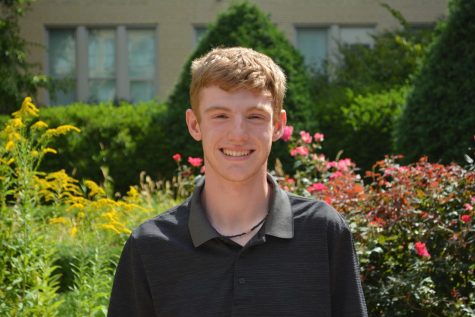
Alex is a senior in his fourth year with The Champion. Alex loves covering news and sports in the Lane community and beyond. He also broadcasts for a variety...

